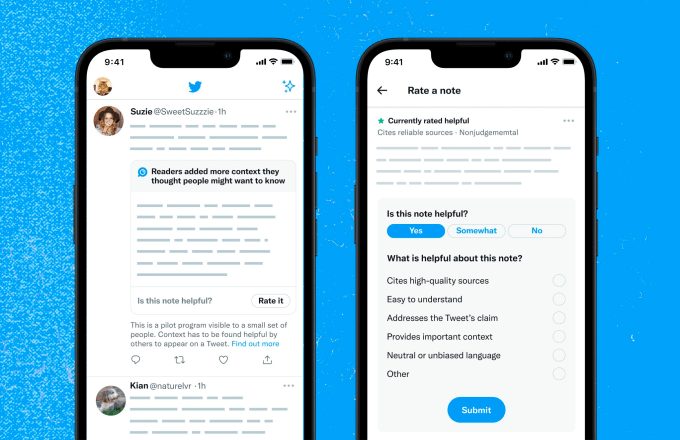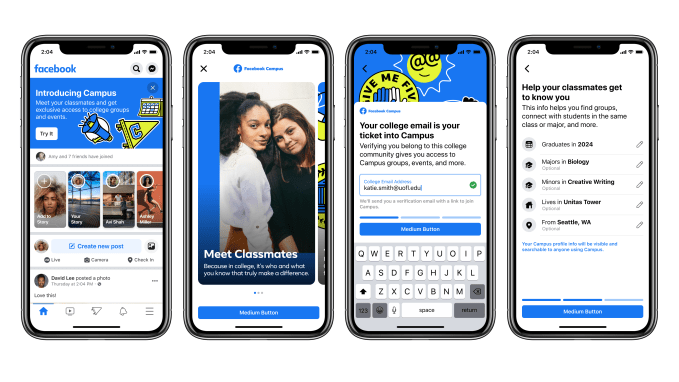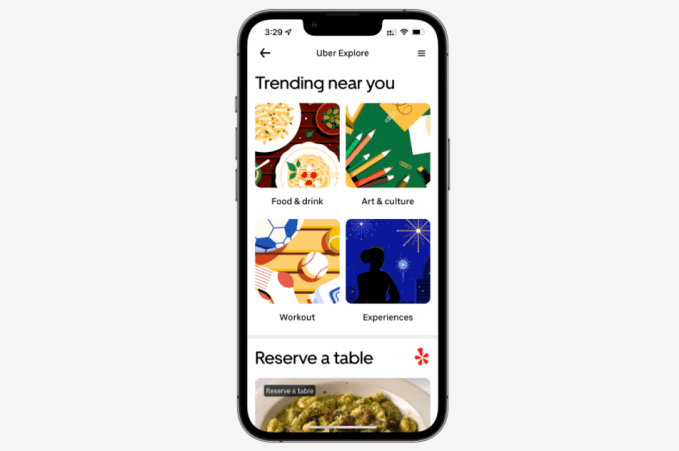This Week in Apps: Apps blocking Russia, Walmart adds virtual try-on, Netflix’s trivia game
Welcome back to This Week in Apps, the weekly TechCrunch series that recaps the latest in mobile OS news, mobile applications and the overall app economy.
The app industry continues to grow, with a record number of downloads and consumer spending across both the iOS and Google Play stores combined in 2021, according to the latest year-end reports. App Annie says global spending across iOS, Google Play and third-party Android app stores in China grew 19% in 2021 to reach $170 billion. Downloads of apps also grew by 5%, reaching 230 billion in 2021, and mobile ad spend grew 23% year-over-year to reach $295 billion.
Today’s consumers now spend more time in apps than ever before — even topping the time they spend watching TV, in some cases. The average American watches 3.1 hours of TV per day, for example, but in 2021, they spent 4.1 hours on their mobile device. And they’re not even the world’s heaviest mobile users. In markets like Brazil, Indonesia and South Korea, users surpassed five hours per day in mobile apps in 2021.
Apps aren’t just a way to pass idle hours, either. They can grow to become huge businesses. In 2021, 233 apps and games generated over $100 million in consumer spend, and 13 topped $1 billion in revenue, App Annie noted. This was up 20% from 2020, when 193 apps and games topped $100 million in annual consumer spend, and just eight apps topped $1 billion.
This Week in Apps offers a way to keep up with this fast-moving industry in one place, with the latest from the world of apps, including news, updates, startup fundings, mergers and acquisitions, and suggestions about new apps and games to try, too.
Do you want This Week in Apps in your inbox every Saturday? Sign up here: techcrunch.com/newsletters
Top Story

Image Credits: Anna Fedorenko (opens in a new window) / Getty Images
The Russia-Ukraine war continued to have a wide-reaching impact on the world of apps as major tech companies took action to block Russian state media outlets, RT and Sputnik, and to further isolate Russia from participating in the broader tech economy. The EU specifically banned the Kremlin-based media outlets in the region, to prevent the further spread of disinformation and propaganda, across EU broadcast channels, online platforms and apps.
The app stores pulled the Russian state-owned media outlets’ apps, RT News and Sputnik News, from their global marketplaces, outside Russia. This includes the ban of RT from the Windows app store, plus Google and Apple’s ban of RT and Sputnik’s apps.
Sensor Tower said that RT News had 5.7 million installs worldwide since its launch in May 2013 across the App Store and Google Play while Sputnik had 2 million installs worldwide since its release in March 2015. Another firm reported different data. Apptopia estimated RT News had 10 million global installs and Sputnik had 3.85 million.
Among other key changes this week:
- Facebook and Instagram said they would suppress the spread of Russian state media via algorithms and will begin attaching labels to their content to provide more context. It also restricted access to their content in the EU, and more recently, the U.K. per a government request.
- Facebook said it would let users in Russia and Ukraine lock their profiles — a feature that prevents non-friends from viewing posts and photos, downloading images and more.
- Instagram announced it would make encrypted DMs available to users in Russia and Ukraine.
- Reddit banned links to Russian state media outlets across its site for all users worldwide and ads that originated from Russia or those that target the country.
- Spotify closed its office in Russia “indefinitely,” and removed all content from Russian state media outlets RT and Sputnik in the EU and other markets, except Russia.
- Snap halted ads in Russia, Belarus and Ukraine, and pledged $15 million to relief orgs. It’s also helping to relocate the 300-plus person Ukrainian staff of its AR platform.
- TikTok blocked Russian state media accounts, Sputnik and RT, in the EU. The accounts are also no longer able to post to audiences within the EU.
- YouTube banned Russian state media outlets in the EU and U.K.
- Google Maps removed newly added user content, like pins, in Russia, Ukraine and Belarus, amid claims of its use in coordinating Russian military activity. Google also disabled live traffic tools on Google Maps.
- Apple halted product sales in Russa, disabled Apple Pay services in the country and, like Google, disabled Apple Maps’ traffic and live incident reports.
- Apple’s Maps and Weather apps began showing Crimea as part of Ukraine in all regions outside Russia, after not showing the region as part of any country since 2019.
- Microsoft halted all new sales in Russia, and is suspending many other aspects of its business in the country.
- Airbnb suspended all operations in Russia and Belarus and said it was offering free short-term housing for up to 100,000 Ukrainian refugees.
- Google stopped selling online ads in Russia on Search, YouTube and outside publishing partners, after similar moves by Snap and Twitter.
Weekly News
Platforms: Apple
- Apple is hosting its next event, dubbed “Peek performance,” on March 8 at 10 AM PT. The company is expected to reveal a new 5G iPhone SE, new iPad Air and possibly new Macs.
- Apple launched its Entrepreneur Camp for Latin founders, which invites developers from the U.S., Brazil, Guatemala and Portugal to receive one-on-one code-level guidance from Apple experts and engineers, mentorships and other insights from Apple leaders.
- A group of software engineers and web developers have launched a project called “Open Web Advocacy“ in the hopes of pushing Apple to allow other browser engines on iOS besides WebKit.
- Apple updated its App Store Small Business Program to no longer reject app transfers — that is, when a developer moved one of their apps to another account. Before, developers who transferred apps were barred from the program.
Platforms: Google
- Google Play Pass, the company’s subscription-based games and app service, launched in India. The service first arrived in late 2019 and now has over 1,000 titles.
E-commerce

Image Credits: Walmart
- Walmart launched an AI-powered virtual clothing try-on feature called “Choose My Model,” which lets online shoppers build a virtual model that matches their dimensions, body shape and skin tone to see what clothes will look like on their own body. The feature is powered by Walmart’s Zeekit acquisition and will be available on the web and in the Walmart mobile app.
Social

Image Credits: Twitter
- Twitter is expanding its community-based fact-checking service Birdwatch to a small and randomized set of U.S. users after testing it since January 2021. The company was recently criticized for not prioritizing fact checks over other features, when the Russia-Ukraine war is leading to a spike in misinformation.
- Facebook is killing its college-student-only social network called “Campus.” The feature was meant to give students a private place to network like the original Facebook had done and had 204 schools on board — but likely not enough traction to continue. The service shuts down March 10 and all data will be deleted.

Image Credits: Facebook
- Instagram’s standalone IGTV app is shutting down in mid-March and IGTV’s in-stream video ads will be discontinued as well. The company is shifting its focus to Reels, where it just rolled out new advertising options for creators.
- Trump’s Truth Social app, a right-wing Twitter alternative, has fallen to No. 57 in the U.S. App Store, as many are still on a waitlist after nine days post-launch, and Trump isn’t posting.
- Nextdoor beat Wall Street expectations in its first earnings report as a public company. The neighborhood social network recorded revenues of $59.3 million, up 47.9% from its year-ago tally of $40.1 million.
- Instagram introduced auto-generated captions for videos initially in 17 languages after TikTok first launched the feature in April 2021.
- Instagram head Adam Mosseri tried to explain why the company isn’t releasing an iPad app, saying there weren’t enough users to justify the work. (Or maybe there are enough iPad users but they just don’t care about Instagram?) He also noted Android is the largest user base and every new surface adds overhead; people share more in messages than Stories and Feed; and Instagram is “leaner than you think.”
Photo/Video + Creator Tools
- Face-swapping video app Reface, developed in Ukraine, showed its support for its home country in an interesting way. The app implemented push notifications that alerted its 200 million-strong user base about Russia’s invasion and urged people to #StandWithUkraine by watermarking the videos created in the app.
Streaming & Entertainment
- iHeartRadio modernized the radio call-in with its new “Talk Back” feature. The company’s mobile app now offers a microphone button that lets listeners send in voice messages to their favorite radio programs and soon, iHeartRadio podcasts, too. The tool integrates directly with the company’s CMS so the messages can be received in near real time to enhance the radio broadcast. IKHeartRadio says it’s open to expanding access to other broadcasters and podcasters in the future, too.

Image Credits: iHeartRadio
- Disney announced its streaming service, Disney+, would introduce an ad-supported subscription tier later this year. Pricing was not detailed, but the service’s current ad-free plan costs $7.99 per month or $79.99 per year.
- Twitch’s new policy cracks down on chronic spreaders of misinformation on the streaming service, and will take down channels that routinely lie about vaccines and election fraud, as well as Russian state-run media.
- Verizon introduced Plus Play, a new platform that will bundle customer subscriptions across devices, including those for Netflix, Peloton, Disney+, A+E Networks, Duolingo, Calm, Discovery+, AMC Plus, Hulu, The Athletic and more in gaming and news. (Some were already partners before this move.) The service is meant to help customers centralize their subscriptions in one place and plans to offer exclusive deals, Verizon said.
- Twitter is working on a “Podcasts” feature in its app, which could possibly serve as a home for recorded Twitter Space in the future.
Gaming

Image Credits: Netflix
- Netflix is launching a new interactive daily trivia game, called “Trivia Quest.” The show, which begins airing April 1, is based on the popular Trivia Crack mobile game, which Netflix licensed as part of its broader gaming push. The game will be playable across platforms, including mobile.
- Mobile games Apex Legends Mobile and Battlefield Mobile will be delayed. EA and Industrial Toys indirectly cited Russia’s invasion of Ukraine (described on Twitter as “current world events“), as the reason.
- Samsung was caught throttling the performance of 10,000 apps on its phones, with its Game Optimizing Service likely to blame. The throttled apps weren’t limited to games, as other top apps — like Office, Google Keep, TikTok and even Samsung’s own apps — were also impacted. Benchmark apps, however, were not throttled. The company said an update is on the way to fix the issue.
- Amazon launched its cloud-based game streaming service Luna in the U.S. with free games for Prime members and more via subscription. Users can try Luna on Fire TV using their iPhone or Android phone as a controller via the Luna Controller app.

Image Credits: Amazon
- Snowman announced its anticipated remastered expansion of Alto’s Adventure, dubbed Alto’s Adventure: The Spirit of the Mountain,” will comes to Apple Arcade on March 25.
Productivity/Utility
- Popular productivity app maker Readdle, founded in Ukraine, pulled its apps from the Russian App Store and says it will not do any business with Russian-owned companies. Existing users in Russia will still have access to the apps, but will receive no future updates or support. In a statement, the company shared its reasoning, saying: “Readdle was founded in Ukraine, and many of our employees call it home. Right now, Russian armed forces are bombing & attacking Ukraine by land, air, and sea. Our company stands with the people and government of Ukraine against the Russian invaders.”
- Slack said it’s dropping support for iOS 13 on iPhone and iPad, forcing users to move to at least iOS 14 which was released in 2020.
- Rakuten Viber said it’s launching free “Viber Out” calls in 34 countries that allow users to reach any phone number, landline or mobile phone. It also disabled advertising within Russia and Ukraine.
- Zillow users now compare for-sale home listings with a new “Homes to Compare” tool in the Zillow mobile app.
Transportation

Image Credits: Uber
- Uber becomes even more of a super app. The ride-hailing and food delivery app Uber launched a new feature that will allow customers in 15 cities across the U.S. and Mexico to book dinner reservations or other experiences directly in the app. Users will find the options in Uber’s new Explore tab, where they can browse categories like food and drink, art and culture, nightlife, music and shows, and more.
Government & Policy
- A bipartisan group of state attorneys general will investigate TikTok to determine if the video platform negatively affects the psychical or mental health of younger users or if it violates state consumer protection laws. The investigation is the latest to examine the potential harms of Big Tech, and follows TikTok’s release of several minor safety features clearly meant to assuage regulators’ and investigators’ concerns.
- Apple, which has now been fined six times by Dutch regulators for failing to comply with rules around dating apps and in-app purchases, said in a letter that its App Store IAP changes comply and only need a “minor technical change.”
Security & Privacy
- A report by The Markup looks into how location data brokers have simply shifted tactics since Apple and Google rolled out stricter policies. Instead of relying on SDKs that automatically sent data to brokers, they will often just buy the data directly from app publishers, who hide their disclosures in legalese about sharing data with “partners.” And policies don’t necessarily require apps to disclose who the data is sold to.
- An Android banking trojan designed to steal user data, including passwords and text messages, was discovered in Google Play and downloaded thousands of times.
Funding and M&A
 Netflix acquired Finland-based mobile game developer Next Games for around $72 million to expand its games business. Netflix has been offering subscriber-only games through its mobile apps on iOS and Android through partnerships and licensing deals. Next Games had ties to Netflix already, having published the role-playing game “Stranger Things: Puzzle Tales.” It had reported sales of $30.2 million in 2020, largely from in-app purchases.
Netflix acquired Finland-based mobile game developer Next Games for around $72 million to expand its games business. Netflix has been offering subscriber-only games through its mobile apps on iOS and Android through partnerships and licensing deals. Next Games had ties to Netflix already, having published the role-playing game “Stranger Things: Puzzle Tales.” It had reported sales of $30.2 million in 2020, largely from in-app purchases.
 Thatgamecompany, makers of the popular mobile game “Sky: Children of the Light,” raised $160 million from TPG and Sequoia Capital. “Sky” has over 160 million downloads and nearly 7 million DAUs. The company also added Pixar co-founder Ed Catmull as a principal adviser.
Thatgamecompany, makers of the popular mobile game “Sky: Children of the Light,” raised $160 million from TPG and Sequoia Capital. “Sky” has over 160 million downloads and nearly 7 million DAUs. The company also added Pixar co-founder Ed Catmull as a principal adviser.
 Alibaba-backed Perfect Corp., makers of AR camera app YouCam and maker of tech that powers virtual AR try-on features at Google, Pinterest, Snap and others, to go public in a SPAC merger valuing the business at $1 billion. The company will raise up to $335 million in the merger.
Alibaba-backed Perfect Corp., makers of AR camera app YouCam and maker of tech that powers virtual AR try-on features at Google, Pinterest, Snap and others, to go public in a SPAC merger valuing the business at $1 billion. The company will raise up to $335 million in the merger.
 Fortnite maker Epic Games acquired online music platform Bandcamp for an undisclosed sum, hinting at its “music metaverse” ambitions. The company will continue to function as a standalone operation, it said.
Fortnite maker Epic Games acquired online music platform Bandcamp for an undisclosed sum, hinting at its “music metaverse” ambitions. The company will continue to function as a standalone operation, it said.
 Bengaluru-based Pocket FM, which offers a streaming app for audiobooks and podcasts, raised $65 million in Series C funding led by Goodwater Capital, Naver and existing investor Tanglin Venture Partners. The app offers more than 100,000 hours of content and reports having over 50 million users.
Bengaluru-based Pocket FM, which offers a streaming app for audiobooks and podcasts, raised $65 million in Series C funding led by Goodwater Capital, Naver and existing investor Tanglin Venture Partners. The app offers more than 100,000 hours of content and reports having over 50 million users.
 Stax raised $2.2 million in a seed extension round for its app that allows Africans to buy airtime, send and request money and transfer funds between accounts. U.S. firms World Within Ventures and Noemis Ventures co-led the round. Stax has 170,000 customers, 40,000 of which are monthly actives.
Stax raised $2.2 million in a seed extension round for its app that allows Africans to buy airtime, send and request money and transfer funds between accounts. U.S. firms World Within Ventures and Noemis Ventures co-led the round. Stax has 170,000 customers, 40,000 of which are monthly actives.
 U.K. investment app Shares raised $40 million in Series A funding in a round led by Valar Ventures. The company has 130 employees in London, Paris and Krakow and is working to expand the app to other EU markets.
U.K. investment app Shares raised $40 million in Series A funding in a round led by Valar Ventures. The company has 130 employees in London, Paris and Krakow and is working to expand the app to other EU markets.
 Food delivery app maker DoorDash acquired hospitality tech startup Bbot for an undisclosed sum. The deal aims to expand DoorDash’s services, like DoorDash Drive and DoorDash Storefront; increase partner restaurant sales; and reduce wait times to order and pay.
Food delivery app maker DoorDash acquired hospitality tech startup Bbot for an undisclosed sum. The deal aims to expand DoorDash’s services, like DoorDash Drive and DoorDash Storefront; increase partner restaurant sales; and reduce wait times to order and pay.
 Mobile marketing company AppLovin to acquire content distribution and advertising service for connected TVs, Wurl, for $430 million, 55% cash and 45% stock. The deal will close in the first half of 2022, and follows AppLovin’s acquisition of Twitter’s MoPub.
Mobile marketing company AppLovin to acquire content distribution and advertising service for connected TVs, Wurl, for $430 million, 55% cash and 45% stock. The deal will close in the first half of 2022, and follows AppLovin’s acquisition of Twitter’s MoPub.
 HearHere, a storytelling app designed for road trips, raised $3.2 million in seed funding to scale its business. The app, which is also backed by actor Kevin Costner, has more than 100,000 registered users and offers more than 8,880 stories across the U.S. The new round was led by RV and outdoor camping retailer Camping World.
HearHere, a storytelling app designed for road trips, raised $3.2 million in seed funding to scale its business. The app, which is also backed by actor Kevin Costner, has more than 100,000 registered users and offers more than 8,880 stories across the U.S. The new round was led by RV and outdoor camping retailer Camping World.
 Flashfood raised $12.3 million in Series A funding to scale its grocery app that aims to tackle food waste. The app lets users browse deals at nearby grocery partners, then pay for items in the app and arrange for pick up. To date, the company claims to have saved shoppers $100 million and diverted more than 34 million pounds of food from landfills.
Flashfood raised $12.3 million in Series A funding to scale its grocery app that aims to tackle food waste. The app lets users browse deals at nearby grocery partners, then pay for items in the app and arrange for pick up. To date, the company claims to have saved shoppers $100 million and diverted more than 34 million pounds of food from landfills.
 GetMyBoat, a boat rental marketplace and mobile app, raised $21 million in Series B funding. Japanese manufacturing company Yanmar Global took a majority stake in the company, which now overs over 150,000 rentals in 9,300 destinations.
GetMyBoat, a boat rental marketplace and mobile app, raised $21 million in Series B funding. Japanese manufacturing company Yanmar Global took a majority stake in the company, which now overs over 150,000 rentals in 9,300 destinations.
 iSpot, a real-time TV measurement company, expanded its cross-platform viewing verification capabilities through the acquisition of Tunity, a TV-viewing solutions and analytics company that measures consumer viewing habits in public locations nationwide. Through its iOS/Android app, Tunity allows users to hear live audio from muted televisions directly on their mobile devices.
iSpot, a real-time TV measurement company, expanded its cross-platform viewing verification capabilities through the acquisition of Tunity, a TV-viewing solutions and analytics company that measures consumer viewing habits in public locations nationwide. Through its iOS/Android app, Tunity allows users to hear live audio from muted televisions directly on their mobile devices.
Download This
MyHeritage (update with LiveStory)
Last year, genealogy service MyHeritage went viral after introducing a new “deepfake” feature that allowed users to animate the faces of loved ones in still photos. TikTok users posted videos reacting to the technology, called “Deep Nostalgia,” as they brought back relatives they never got to meet or those whose loss they still grieved. To date, more than 100 million photos have been animated with the feature. Now comes the next iteration. This week, MyHeritage along with technology partner D-ID is expanding upon “Deep Nostalgia,” with the launch of “LiveStory,” a feature that doesn’t just bring the people in photos to life with movement, but actually has them speak.
The company licensed the new technology from D-ID, a Tel Aviv-based startup that works to create patented video reenactment technology powered by AI and deep learning techniques.
To make the lips match the words, D-ID trained a neural network on a database of videos of people speaking. Its technology is able to work with any language, the company says. The MyHeritage implementation, however, supports 31 languages, including dozens of dialects, with both male and female voice options. After the LiveStory is created, users can watch it, share it with friends or post it to social media. They also can customize the story further by editing the text, choosing a different voice or even uploading their own audio recording.
The feature is available in the MyHeritage mobile app and is free to use a few times before a subscription is required.
from https://techcrunch.com/2022/03/05/this-week-in-apps-apps-blocking-russia-walmart-adds-virtual-try-on-netflixs-trivia-game/



No comments: